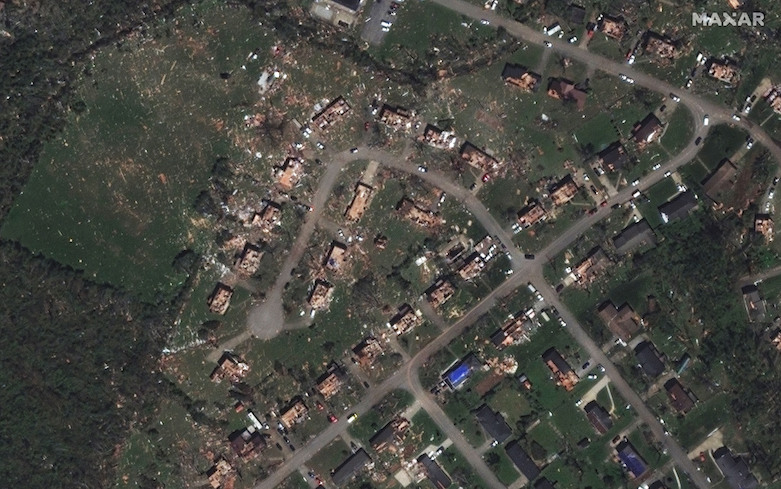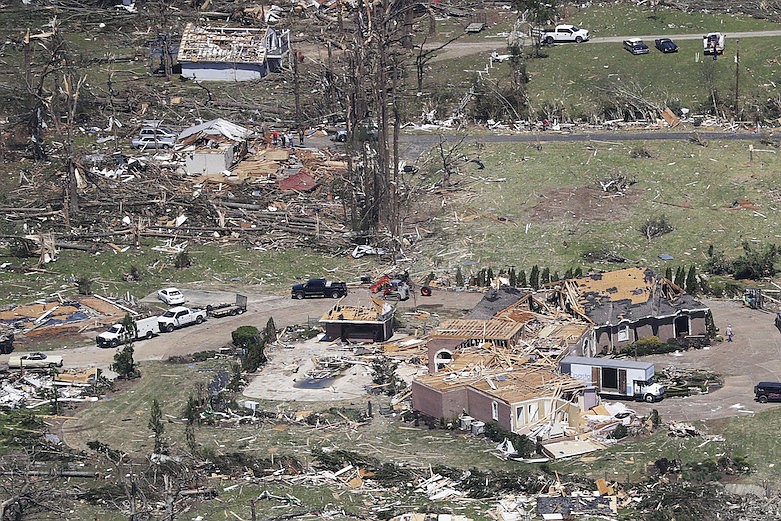Hamilton County did not send any alerts or sound any sirens before an EF-3 tornado plowed through the area late Sunday night, killing two and injuring more than a dozen others locally.
The storm carrying the tornado had its origin in either Texas or Louisiana, according to National Weather Service Meteorologist Anthony Cavallucci on Monday, and was reported as early as Friday by local television meteorologists, but still managed to ravage much of Chattanooga, East Ridge, Collegedale and other parts of Hamilton County without any advance notice.
According to county officials, topography, timing and county siren practices contributed to the lack of warning.
"A lot of people say 'Well, why don't you have sirens?' or whatever. Well, we happen to live in a community where there's a nuclear plant," Coppinger said, noting that there is a siren system locally, but it is reserved for radiological alerts. "There's a real difference between a nuclear event, when we don't want you to shelter in place ... with a tornado it's a little different."
When asked why the county didn't send a phone warning, Emergency Management Communications Director Amy Maxwell said that the alerts had been unfavorable to citizens in the past.
"We don't use the integrated emergency messages much. We used to use those test messages once a month, but people were getting them at very early hours of the morning because, unless you have Verizon, many cellphones just don't get them for sometimes one or 12 hours later," Maxwell told the Times Free Press Tuesday. "And then the problem with this storm is that we had two or three minutes once this storm had a tornado so towers were torn down before we could have issued an alert."
Maxwell did say, despite the unpopularity with citizens, the county would have "definitely" still sent alerts had they had ample notice of the tornado.
Emergency Management posted flood and wind warnings to Twitter on Sunday evening, in the hours before the tornado hit between 11:15 and 11:30 p.m., but didn't share any update about the storms from 10 p.m.-1 a.m.
"The storms were moving over 100 miles-per-hour and we could see they were going up and coming back down. The problem is trying to map what's going to happen at that point," Maxwell added.
To fill in for the county's lack of alerts, Maxwell and Coppinger recommend citizens seek emergency notices elsewhere.
 This Tuesday, April 14, 2020, satellite image provided by Maxar Technologies shows part of a neighborhood in Chattanooga, Tenn., after one of the tornados went through the region Sunday and Monday. The coronavirus pandemic is complicating relief work after storms killed multiple people across the South. (Maxar Technologies via AP)
This Tuesday, April 14, 2020, satellite image provided by Maxar Technologies shows part of a neighborhood in Chattanooga, Tenn., after one of the tornados went through the region Sunday and Monday. The coronavirus pandemic is complicating relief work after storms killed multiple people across the South. (Maxar Technologies via AP)"We recommend you download any weather apps, all three local TV stations have them, and get a weather radio," Maxwell said. "We send out information ahead of time to plan ahead and, we can't emphasize it enough, people need to plan."
(READ MORE: Loss of life, property comes into focus as Chattanooga area reels after violent storms)
"We've been doing this for a number of years through our local media and our emergency management operations, just to encourage people to go out and purchase these radios," Coppinger echoed at a Tuesday press conference.
Maxwell added that everyone, specifically people who are most susceptible to storm damage, are "responsible" for planning to stay safe during weather events.
"If you live in an unstable location, like a mobile home, you need to have a plan to have somewhere [safe to go] well ahead of there actually being a storm," Maxwell said. "People are responsible, especially if they live somewhere unsafe, for having a plan in case of this kind of emergency."
Contact Sarah Grace Taylor at staylor@timesfreepress.com or 423-757-6416. Follow her on Twitter @_sarahgtaylor.

